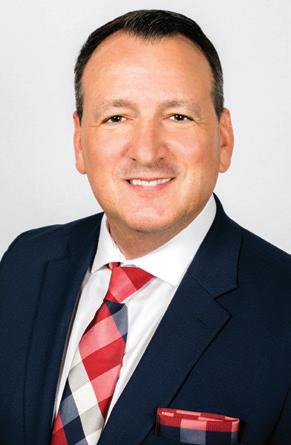
4 minute read
Ask the Expert: Ameresco Canada
ASK THE EXPERT: AMERESCO CANADA INC. LDCS AND CARBON CUTS:
THREE FINANCING STRATEGIES TO MOBILIZE YOUR COMMUNITIES By Scott Vokey
Advertisement
We need electrification, innovation, behaviour changes, and massive efficiency gains to achieve the emission reductions required to meet our Paris Agreement commitments, according to the International Energy Agency’s 2020 World Energy Outlook. In other words, we must move beyond our current anemic response to a war-effort level of total mobilization. While COVID-19 has hampered our response, I know Ontarians can mitigate and adapt to climate change if we all pull together.
While LDCs have a crucial role in supporting fuelswitching and electrification initiatives, they will not be able to ensure Ontario achieves net-zero emissions on their own. LDCs must unite with their municipal shareholders, customers, energy service providers, community groups, and the finance community.
Utilities (and municipalities) will also have to think differently as the financing tools traditionally used for climate mitigation are not enough to achieve deep and widespread emission reductions. Repayment mechanisms that can address these specific challenges must be utilized if we are going to deploy the capital required. Inspired LDCs can utilize three key finance strategies1 to help mobilize their communities for deep and widespread emission reductions.
On-bill repayment
Using an on-bill repayment (OBR) program, the utility pays a third-party partner, such as Ameresco, for the energy improvement and recoups this payment from their customer as an add-on to the utility bill. It is distinct from on-bill finance (OBF) in that the utility does not have to pay for program management (underwriting, capital utilization) or marketing as this is handled by the partner.
This is a highly secure repayment mechanism and loans remain with the property upon sale, which provides financing flexibility to customers. However, LDCs may need OEB approval before moving forward with OBR or OBF – if each project requires its own contract – and there is administrative complexity. A pilot being developed by Oshawa Power and the Region of Durham may provide more answers.
PACE and/or C-PACE
Enabled under Regulation 586/06 of the Municipal Act, Property-Assessed Clean Energy (PACE) is designed to help property owners overcome the barrier of high up-front costs. PACE allows building owners to finance qualifying improvements through a voluntary tax assessment. They pay for the improvements over time and the repayment obligation transfers automatically upon sale.
Benefits include low up-front investment, long-term financing, immediate positive cash flow, low interest rates, and ability to pass payments through to tenants. Commercial Pace (C-PACE) operates in the same manner and has the additional benefits of offering non-recourse and non-accelerating financing that is often off-balance sheet.
The primary challenge with these models is that they require a willing and able municipal partner to administer – and the few municipal programs on offer in Ontario have floundered. However, LDCs can partner with third parties like Ameresco to offer municipalities administrative, marketing, and implementation support.
UESC featuring EPC and EaaS financing
70+ American utilities participate in the Utility Energy Service Contract (UESC) program in which contracted third-parties design, implement, and finance a wide range of energy and facility-renewal initiatives for federal clients. UESCs provide a streamlined contracting approach for a broad spectrum of energy services.
1 Both the On the Money: Financing Tools for Local Climate Action (ICLEI 2018) and Efficiency Financing Tools for the Canadian Context (Toronto Atmospheric Fund 2017) reports are highly recommended for more detail on the first two tools discussed here.
Credit: Scott Graham on Unsplash
The utility’s partner assesses the opportunities, designs and implements the desired energy measures, and may provide financing for the project. The customer may use any combination of appropriations and financing to pay for the project.
Unfunded liabilities and aging infrastructure are a source of concern for many facility owners, but these fiscal strains can be turned into sources of cash through either an Energy Performance Contact (EPC) or the Energy-as-a-Service (EaaS) model. As a firm that has sourced and raised over $3.5 billion of financing for projects, we at Ameresco appreciate how project financing can benefit customers and utilities.
Customers benefit from reduced upfront costs, risk transfer to a third party, increased resiliency, reduced GHG emissions, and shifting a capital cost into an operating cost. This enables them to complete necessary infrastructure upgrades when budgets are too tight or non-existent. Utilities benefit from increased system reliability through improved customer load profiles, increased participation in incentive programs, and brand growth.
We believe that LDCs can partner with organizations such as Ameresco to build a cleaner, more prosperous province with a stronger economy and a better electricity system. We have risen to great challenges before and as Winston Churchill once said: “We shall not fail or falter. We shall not weaken or tire. Give us the tools and we will finish the job.”
Interested in learning more about any of these innovative energy finance mechanisms? Our advisors at Ameresco helped enable PACE in Ontario and have experience with a range of energy finance instruments.
Scott Vokey Director – Asset Solutions Strategy & Outreach, Ameresco Canada Inc. T (905) 955-8095 E svokey@ameresco.com
MARKETPLACE
www.pui.ca
Meter Services Peterborough, a Division of Peterborough Utilities Inc. is a provider of revenue meter related services in Ontario. We are IESO registered as MSP #1002 and provide meter installation services; Meter Data Management (MDMA) functions; Web posting of data and bill reconciliation (MDS Web); Settlement Services (WSS Web); Conservation and Demand Management and Power Quality Monitoring Solutions to Wholsale Market Participants, Local Distribution Companies, Energy Services Companies and Generators. Please contact us at 705-748-9301 ext. 1279 for more infromation on our suite of service offerings










